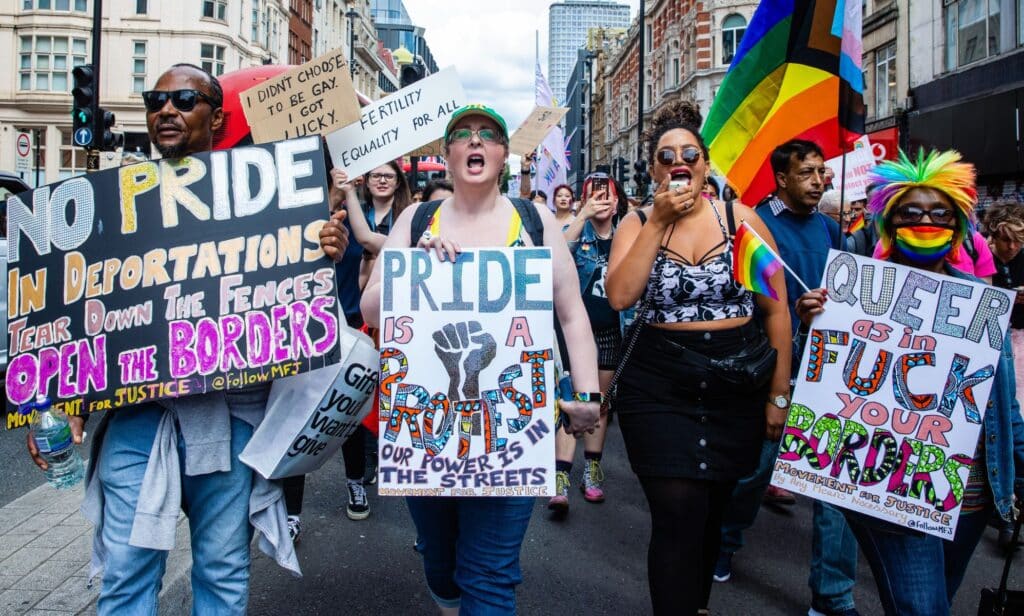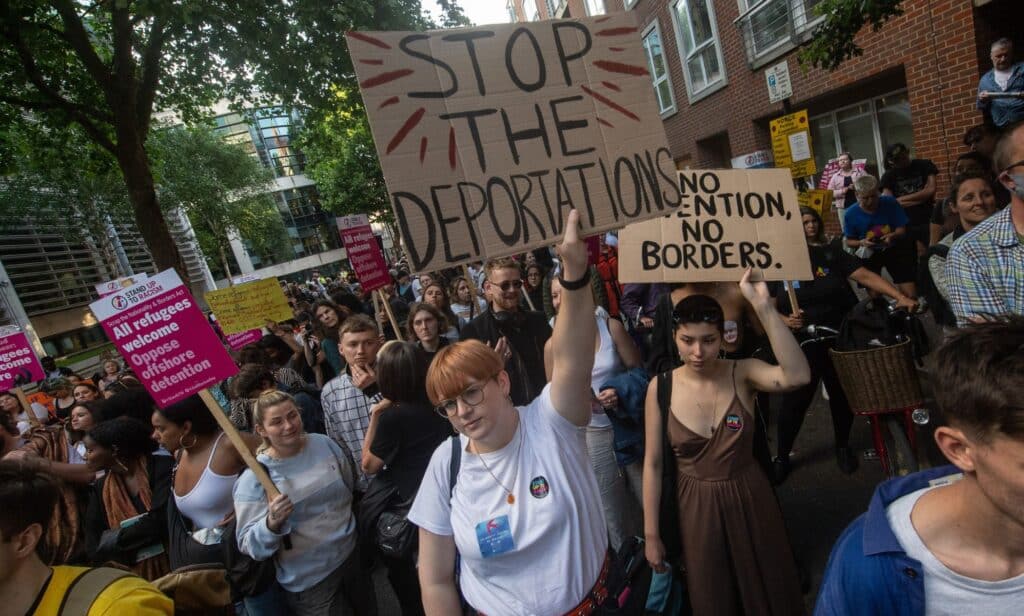Home Office has sent 3,000 queer refugees back to violent anti-LGBTQ+ countries, new data reveals

LGBTQ+ advocates and activists have denounced the Tory government for failing to support queer asylum seekers. (Getty/Dan Kitwood)
The Tory government has been accused of “failing to stand up” for the LGBTQ+ community as it emerged that the Home Office granted fewer than 700 LGB asylum claims in 2021.
Home Office data, released Thursday (25 August), revealed that only 677 people were granted asylum or other forms of leave based on sexual orientation claims in 2021 (the data only specified LGB claims).
This was out of 1,050 initial decisions, with the number covering many cases that were lodged in previous years.
The government noted these asylum seekers may not have necessarily been granted protection based on the sexual orientation part of their claim. Others may have been granted protection on another basis.
While the rate of accepted claims rose by 43 per cent compared to 2019, applications overall in 2021 plunged.
There were 415 LGB asylum applications lodged in the UK in 2021, 77 per cent fewer than in 2019. Total asylum applications rose by 36 per cent in the same period.
Over 100 of the successful applications for asylum were from LGB people fleeing Pakistan, which criminalises LGBTQ+ people. Pakistan criminalises same-sex sexual activity between men, and the maximum penalty is life imprisonment or the death penalty. The Home Office granted asylum to dozens of queer people from Bangladesh, Nigeria, Iran, Uganda and Iraq.
Analysis of the Home Office data by the Liberal Democrats revealed that the Tory government has sent 3,071 LGBTQ+ asylum seekers back to countries where homosexuality is criminalised since 2017.
The party said this includes 1,048 Pakistanis and 570 Bangladeshis where queer people can face life in prison for having sex. The Home Office also refused applications from 381 Nigerians who face over a decade in prison or death for same-sex acts.

Only 677 LGB asylum seekers were granted asylum or other forms of leave by the Home Office in 2021. (Getty/Dan Kitwood)
Lib Dem home affairs spokesperson Alistair Carmichael said the government must do all it can to “help people who are forced to flee violence and persecution simply for who they are and who they love”.
“The UK should be advancing the cause of LGBT+ rights, at home and abroad, and offering sanctuary to those who need it,” Carmichael said.
He accused the Tory government for “failing to stand up” for LGBTQ+ rights and “sending thousands of people back to countries where homosexuality is still against the law”, while calling on PM hopefuls Liz Truss and Rishi Sunak to commit to ending the Home Office’s “appalling culture of disbelief towards LGBT+ asylum seekers”.
A Home Office spokesperson told PinkNews that every asylum case is “considered on a case-by-case basis” and that “no one is removed unless it is safe for them to do so”.
Hostile environment could be preventing refugees from even trying to find safety in UK
Sebastian Rocca, founder and CEO of LGBTQ+ asylum charity Micro Rainbow, told PinkNews he was “surprised” to see the number of LGB asylum seekers drop as the non-profit has been an “ever increase of requests for support year on year”.
Rocca believed one factor could be that the Home Office figures “don’t take into account trans and non-binary people” claiming asylum in the UK.
“We got a couple of emails from trans people who wanted to seek asylum, and they decided to go to other countries because of how hostile the UK has become,” Rocca said.
“It made me reflect: Is this [drop] because they’re not including everybody? Or is this because the UK has become famous for its hostility towards LGBTQ+ people that they don’t make this their preferred country of destination”.
The Tory government’s reviled Nationality and Borders Act will toughen Britain’s already stringent immigration process and criminalise those entering the country without a valid visa or via what the government called “irregular routes”.

Activists have opposed the Tory government’s Nationality and Borders Bill for imperilling LGBTQ+ asylum seekers. (Mark Kerrison/In Pictures via Getty)
Rocca said it was concerning that the government is focusing on legislation concerning “how people come to the UK as opposed to why”.
“We are looking at technicalities as opposed to the humanity of the system,” Rocca said. “So if you come on a private jet with a visa, you’re fine – but if you fear for your life and you leave and come illegally, you’re going to be penalised.”
Robbie de Santos, director of communications and external affairs at Stonewall, urged the government to “demonstrate international leadership on supporting LGBTQ+ asylum seekers” fleeing violence, persecution and criminalisation.
“We want to see all asylum seekers in the UK treated with respect and dignity,” de Santos said. “The UK government must move to end the detention of LGBTQ+ asylum seekers, and ensure all individuals who are held in detention have access to free, good quality legal support.”

Hundreds protest against the Home Office fighting to take asylum seekers from the UK to Rwanda, where LGBTQ+ people face persecution. (Getty/Guy Smallman)
There was widespread outrage in May when the Home Office announced that it would send refugees who arrive via the English Channel to Rwanda – despite admitting there’s evidence LGBTQ+ refugees could face persecution in the country.
In 2020, a gay Malaysian man seeking asylum because of homophobic persecution was refused multiple times by Home Office officials because he didn’t have a boyfriend. A lesbian from Zimbabwe faced similar persecution as it took her five gruelling years and countless interviews to convince the Home Office she’s gay and needed asylum.
Téa Braun, chief executive of the Human Dignity Trust, explained LGBTQ+ people live in “constant fear of violence and discrimination” in many of the 70 jurisdictions worldwide that criminalise consensual same-sex intimacy.
“Several courts around the world have held that where these laws are applied in practice, this clearly constitutes persecution for the purposes of asylum protection,” Braun said.
She continued: “A broader understanding of the daily impact of these laws on people’s lives, even where they are not actively enforced, is also vital.
“Many people face such harsh realities that fleeing their family, jobs, community, and everything they know, may be the only option.”

